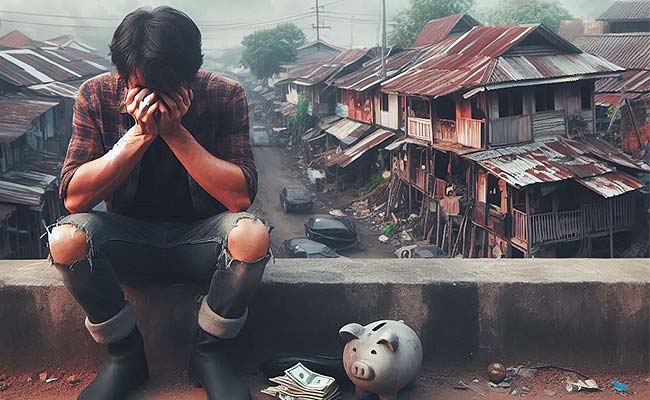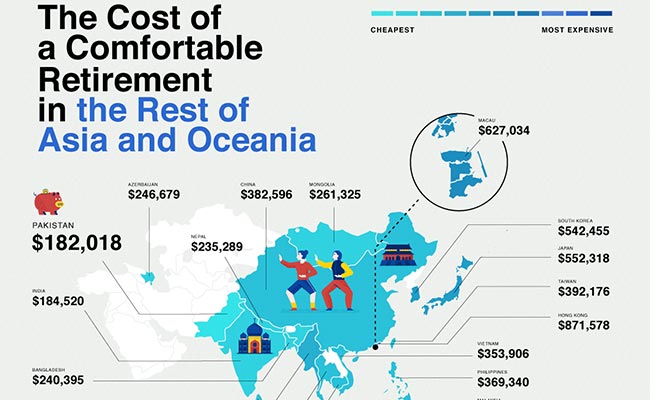People often rave about the upsides of moving to Thailand: the stunning beaches, warm climate, less regulated society, hedonistic nightlife, and the friendliness of the locals.
However, while these aspects may be enticing, living in Thailand is a vastly different experience than being on vacation. As people increasingly consider relocating to Thailand in light of the so-called decline of the Western world, it's essential to look beyond the rose-colored glasses presented by YouTube vloggers.
This article aims to explore the other side of the coin, highlighting the potential challenges and cons that prospective movers should keep in mind when making a decision.

Don't end up miserable. Plan your move thoroughly.
13 Reasons NOT to Move to Thailand
1. Visa Regulations
One of the first hurdles you will encounter when considering a move to Thailand is the visa process. Contrary to popular belief, it’s not as simple as packing your bags, getting on a plane, and making a forever home.
Every expatriate must secure a visa or find employment that provides one along with a work permit. For those under 50, the retirement visa is off the table, leaving limited options for long-term residency.
One alternative is the Elite Visa, but it's essential to thoroughly research all requirements and implications, as the options are not plentiful and can be restrictive.
2. Restrictive Home Ownership
Many dream of owning a home in Thailand, but it's prudent to approach this goal with caution. Renting for at least 2-3 years is advisable to gauge whether you will be able to stay long-term. This timeframe allows you to explore different areas and determine what suits your lifestyle best.
It’s important to understand that while you can buy a house, you cannot own the land unless it's part of a business setup, which can be complicated. In most cases, the land will be leased, and this can create issues concerning inheritance.
Be cautious when considering off-plan purchases, as developments may not always complete, and the company behind them might face financial difficulties. Furthermore, property values in Thailand often decline unless the property is in a highly sought-after location. Construction quality may not meet Western standards, and the market typically favors new developments.
3. Expensive Schooling
When it comes to education, families should be prepared for the high costs associated with good private (international) schools in Thailand. While these institutions may seem appealing, they often do not offer a significantly better quality of education than the state system in Western countries.
Thailand's state schools generally suffer from a lack of funding and facilities, making them a less-than-ideal choice for many expatriates.
4. Extreme Weather
Another consideration, especially for those with kids, is that the weather in Thailand is predominantly hot, and the heat can be oppressive, even during the so-called cool season.
Contrary to popular belief, this often results in children spending less time outdoors, with fewer opportunities for sports and play in parks. Western children may struggle to cope with sun exposure, which can lead to a heightened risk of skin issues, including melanoma.
It’s therefore crucial to monitor sun exposure, especially for children with fair or red hair, as they are more vulnerable. Generally, early mornings and post-4 PM are the safest times for outdoor activities.
Also consider that some regions are prone to flooding during the rainy season, particularly the Northernmost regions.
5. Health Risks
Moving to Thailand presents various health risks that may not be of the same concern back home. Mosquito-borne diseases such as dengue fever and malaria are prevalent, particularly in rural areas. It's crucial to use mosquito repellent and consider nets if sleeping in a room with outdoors exposure.
Additionally, pollution can be a significant problem, especially during crop burning season in rural areas and in industrial regions like Bangkok. Furthermore, road traffic accidents are alarmingly common, so it's essential to prioritize safety and caution when traveling.

Life in Thailand is not always the beach some make it out to be.
6. Health Insurance Expenses
One unavoidable expense families must account for is health insurance, not least because risk of accidents and health-related issues is statistically higher in Thailand than many Western countries.
Since expatriates do not have free access to Thailand's public health system, a comprehensive health insurance plan is essential for covering medical needs.
This can be a considerable financial burden, but it is crucial for ensuring your family’s well-being in case of health issues. Paying to use the public health system is an option, but most staff at public hospitals speak little or no English, and longer waiting are to be expected.
+ Use this health insurance quote widget (to get an idea of the cost)
8. Tax Planning and Obligations
It used to be the case that only income brought into the country in the same year it was earned was eligible for taxation. This has changed to encompass any income brought into the country, regardless of when it was earned.
There are discussions about expanding this requirement to include worldwide income, not just that from your home country. Therefore it is advisable to consult a tax expert to determine whether your financial situation will be tax-efficient under these new rules.
Of course, if you plan on working in Thailand, you will pay income tax as standard.
+ Read full details on tax for expats here
9. Language Barrier
While many Thais working in tourism and international business speak English, the language barrier can still pose challenges in everyday situations, especially in less touristy areas.
This can make communication difficult when it comes to important matters like health care, schooling, and local services. You should invest time and effort into learning basic Thai to navigate daily life more effectively. Start here.
10. Cultural Differences
In addition to the language, cultural norms in Thailand can be quite different from those in Western countries. You may encounter unexpected cultural practices or social etiquette that can be confusing.
For example, showing respect for elders and authority figures is paramount, overt politeness is expected, and public displays of affection are generally frowned upon.
Communication is a complex interplay of spoken and unspoken elements, where both what is said and what is left unsaid hold significant meaning. The nuances in communication can convey emotions and intentions that are often more impactful than the words themselves.
For instance, a smile can carry a variety of meanings depending on the context: it can signify happiness, nervousness, sarcasm, or even discomfort. Understanding and adapting to these cultural nuances can take time and effort.
11. Limited Career Opportunities
Finding suitable employment can be a challenge, as the job market does not offer the same opportunities as in Western countries. Many jobs are restricted to Thai nationals by law, and many companies prefer hiring locals. This can lead to feelings of isolation and frustration for those looking to develop a career.
The most popular job is teaching English as a foreign language, which is easy to qualify in. There are positions available in real estate, translation, specialist software development, and other specific areas of business, but well-paid, specialist jobs for expats are few and far between. For options, read this jobs article.

Thailand can be cheap, but it can also get pretty expensive – depending on the lifestyle you want to have.
12. Limited Public Transportation
While larger cities like Bangkok have a good public transportation system, many areas in Thailand lack reliable public transport. This can be a significant inconvenience for those who do not own a car, making it challenging to navigate daily life. You may need to rely on taxis, motorbike taxis, public trucks, or private transportation, which can be costly over time.
If you live outside a major city, you will likely need to invest in a car. You might choose the cheaper option of a motorbike, but given the high percentage of road traffic accidents involving motorbikes, it is best avoided, especially if you have children.
13. Quality of Goods and Services
While Thailand offers a fantastic array of local products and services, the quality can vary significantly. Families may find that certain items, especially imported goods, are more expensive and not always readily available.
Additionally, service standards may differ from what you might expect in your home country, leading to potential frustration in areas like customer service and maintenance.
Depending on where you settle, you may find limited access to Western-style amenities and conveniences. For those accustomed to specific brands, products, or services, adapting to the local offerings can be a challenge. This includes everything from grocery items to healthcare services that might not meet the same standards as in Western countries.
In Summary
It's in everyone's best interest not to sugarcoat life in Thailand. Like any country, Thailand has its pros and cons, and it's not realistic or helpful to only speak of the good without offering some balance.
Moving halfway across the world is a massive upheaval, and it's crucial to understand exactly what awaits you. By acknowledging both the advantages and the difficulties, you'll be better prepared to make an informed decision.
Failing to do so could lead to disappointment and regret, as unexpected realities surface after the move. A balanced perspective ensures that you're ready for both the joys and the hurdles of life in Thailand, allowing you to settle with realistic expectations and a greater chance of long-term happiness.
More Tips for a Better Life in Thailand
Get Good Health Insurance:
Start with a quick quote here from Cigna. Then you can compare it to other companies.
Send Money to Thailand:
If you are sending money to your loved one, or your own Thai bank account, try Wise here. It is fast and cheap. Me and the majority of my readers are using it.
Improve Your Thai Skills:
Learning Thai makes life easier, and way more fun. I use Thaipod101. Get a free account by clicking here. It is really easy to use.
Last Updated on



Adam Wharmby says
Iv been following you for some time now and have found the articles very insightful and that you take great care to publish very interesting and useful. I met my wife who is Thai here in the UK and with her now back living in Songkhla, I'm about to make the move to Thailand next year. Just wanted to say thanks for the time you take to post here on your site.
All the best Adam
Nov 03, 2024 at 3:52 pm
TheThailandLife says
Nov 03, 2024 at 5:02 pm
Steve Bentley says
I have been comming to none commercial Thailand, anually for four months respite, for 19 years. I am an avid reader. Thank you. Steve
Oct 30, 2024 at 8:00 pm
TheThailandLife says
Oct 30, 2024 at 8:43 pm
Adrian says
We tried it for about two years and we hurried back to our home in W-Europe.
1. The Immigration Office is a pain. New rules are introduced all the time and some rules are very difficult to understand and intended to be unrealistic. Some unexpected conditions are always there without you knowing about it. All for your MONEY, ONLY.
One is aware of the constant Sword of Damocles hanging over you. Ever heard of a visa that requires you to LEAVE THE COUNTRY?
2. It's gets very tiring to constantly asking yourself: WHY? After a little while one just stops asking.
3. What about the girls about which you had an article a little while ago, supporting the elders/family? Who pays, the farang!
4. The thai like your money, not you farangs.
Great country for a 3-4 months holiday and some very nice people but the downsides are there, as well.
As for the poor older suckers without any knowledge of the general reality of life and/or Thai reality who think, at an older age, to find happiness in Thailand I would say: keep your house in your home country or you'll be sorry mate! You used a true word: Hedonistic!
Oct 26, 2024 at 8:06 pm
TheThailandLife says
Oct 29, 2024 at 5:43 pm
John Marsh says
Oct 25, 2024 at 7:54 pm
TheThailandLife says
Oct 29, 2024 at 5:45 pm
JANOS JARAJ says
Oct 25, 2024 at 6:25 pm
TheThailandLife says
Oct 25, 2024 at 6:55 pm
JamesE says
Good article. The reality of Thailand is often hidden by the flashing lights, glowing billboards, and conspicuous consumption of the tourist areas. A reality check is required for anybody thinking of moving to TLOS.
Oct 25, 2024 at 9:57 am
TheThailandLife says
Oct 25, 2024 at 6:58 pm